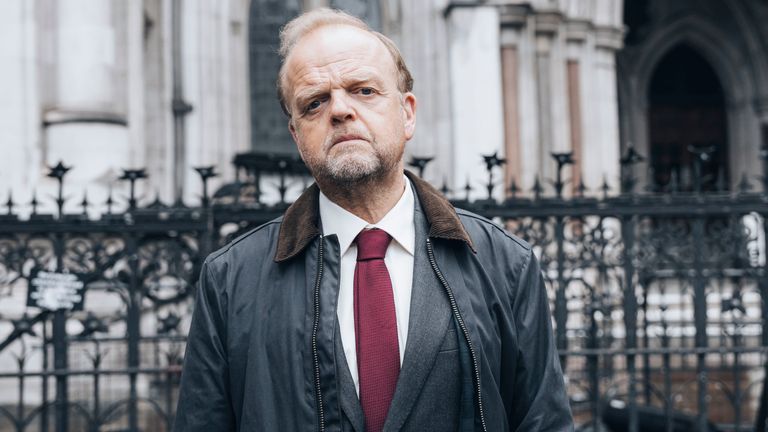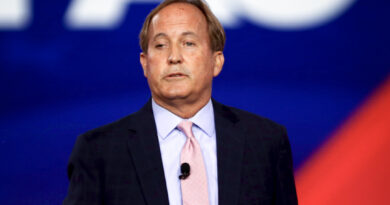“Wolf Hall Director on Streaming Levies: ‘The Government Must Have the Courage to Stand Up to the White House Bully'” | Ents & Arts News
The creator of the acclaimed BBC period drama Wolf Hall asserts that the government “must have the courage to confront the bully in the White House” to safeguard the future of public service broadcasting.
Peter Kosminsky expressed to Sky News’ Breakfast with Anna Jones that the call for a streaming levy to bolster British high-end TV production is urgently needed to prevent the “devastation” of the UK industry.
His remarks follow the publication of a new report from the Culture, Media and Sport (CMS) committee, urging the government to enhance support mechanisms for the UK’s high-quality drama sector while ensuring the production of uniquely British content.
In particular, the report suggests that streaming platforms – including Netflix, Amazon, Apple TV+, and Disney+, all of which operate out of the US – should contribute 5% of their UK subscriber revenue into a cultural fund to help finance drama that specifically appeals to British viewers.
Kosminsky, who advocated for the levy and provided evidence to the committee in January, labeled the global tariffs recently imposed by Donald Trump as “the elephant in the room.”
He expressed concern that these tariffs might deter the government from implementing a streaming levy, emphasizing that it’s a vital move to “protect a century of respected tradition in public service broadcasting in this nation and to prevent it from failing due to fears stemming from the bully in the United States.”
Kosminsky also pointed out that streaming platforms could apply for funding from the cultural fund, provided they collaborated with a UK public service broadcaster.
Earlier this year, a memorandum from the White House noted that levies on US streaming services were “one-sided, anti-competitive policies” that “infringe on American sovereignty”.
In reaction to the proposed streaming levies, a Netflix representative remarked that such a strategy would “harm audiences” and “reduce competitiveness”.
They further stated: “The UK is Netflix’s largest production hub outside North America, and we aim to keep it that way.”
The Association for Commercial Broadcasters and On-Demand Services (COBA) argued that such a levy “could undermine UK growth and the global success of the UK TV industry,” warning it “would likely dampen the investment from streamers in domestic content while inevitably raising costs for businesses”.
COBA welcomed the committee’s endorsement of targeted tax incentives for domestic dramas.
Kosminsky additionally informed Sky News that the second season of Wolf Hall was nearly scrapped just six weeks prior to shooting due to funding constraints, adding: “It was only because the producer, director, writer, and leading actor all agreed to significantly reduce their salaries that the project was able to proceed.”
He mentioned that both he and Sir Colin Callender, the show’s executive producer, had “contributed 11 years of unpaid effort to the show based on the understanding they would receive compensation once production began”, calling it “a devastating loss” to see that opportunity vanish.
Having spent his entire career in public service broadcasting, Kosminsky described it as “incredibly heartbreaking for myself and colleagues to witness the destruction of the industry that has nurtured us and that we hold dear.”
Although he expressed being a “great admirer of streaming services”, he noted that their “considerable financial resources” had “inflated the cost of our work” to the extent that traditional broadcasters can no longer afford to produce high-quality television.
This week, the series Adolescence, created by British talents Jack Thorne and Stephen Graham, became the fourth most-viewed English-language series in Netflix’s history, reaching 114 million views.
However, while certain distinctly British shows may be picked up by streamers due to their broad appeal, Kosminsky cautioned that dramas like ITV’s Mr Bates Vs The Post Office and BBC’s Three Girls, which addresses the grooming of young girls by gangs in northern England, might be at risk of being overlooked in the future.
He warned: “These are not dramas likely to be produced by streaming platforms; they resonate with issues of free speech in this nation. It’s a fundamental aspect of what we regard as a democratic society, which allows us to produce dramas and programs that engage with pivotal public policy issues that might not pique American interest.”
The CMS report follows an inquiry into the British film and high-end television industry, exploring how domestic and foreign investment production is affected by the expansion of streaming platforms.
Dame Caroline Dinenage, chairwoman of the CMS committee, stated that “without government intervention to restore equity between streamers and public service broadcasters (PSBs), countless uniquely British narratives will fail to reach our screens.”
A spokesperson for the DCMS acknowledged the hurdles facing the UK film and TV industry and confirmed that they are collaborating through their Industrial Strategy to identify what further actions are necessary to promote growth and cultivate a skilled workforce. They appreciated the committee’s report and will provide a response in due course.






